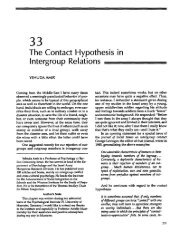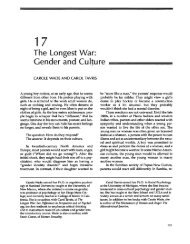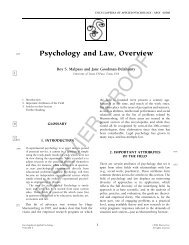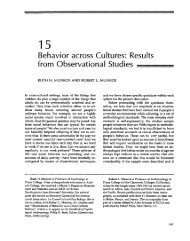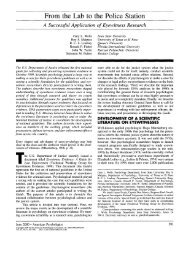Culture shock due to contact with unfamiliar cultures.
Culture shock due to contact with unfamiliar cultures.
Culture shock due to contact with unfamiliar cultures.
Create successful ePaper yourself
Turn your PDF publications into a flip-book with our unique Google optimized e-Paper software.
Online Readings in Psychology and <strong>Culture</strong>, Unit 15, Chapter 8http://www.ac.wwu.edu/%7Eculture/Bochner.htmThe technical term for preferring like-minded people is in-group bias. The theory underlying it is basedon the principle that the similarity of another person is reassuring. The world is a complex place <strong>with</strong>many choices and alternatives <strong>to</strong> offer. It is frequently unclear as <strong>to</strong> how people should behave in socialsituations that are often ambiguous. Such uncertainty can be unpleasant, and ac<strong>to</strong>rs will seek guidanceabout how <strong>to</strong> "correctly" conduct themselves. Books and magazines on etiquette provide one source ofadvice, as does religious doctrine for the devout. However, a more common solution is <strong>to</strong> ascertain howother people deal <strong>with</strong> the problem, the technical term for this process being consensual validation.Individuals <strong>with</strong> similar values and practices provide confirmation that our opinions, actions anddecisions are righteous and correct. And conversely, a dissimilar person may undermine such security.Although the term "culture" has been defined in a variety of ways, common <strong>to</strong> all of them is theprinciple of culture as shared meanings. It follows from this definition that <strong>contact</strong> between culturallydiverse people will take place among individuals who are dissimilar, quite possibly <strong>with</strong> respect <strong>to</strong>important, deeply felt issues. A further implication is that such interactions may be aversive and cause"culture <strong>shock</strong>", that is, create anxiety, and in extreme cases fear and loathing in the participants.The <strong>Culture</strong>-Distance HypothesisResearch, much of it reviewed in our book, has shown that the greater the cultural distance separatinginteracting participants, the more difficulty they will have in establishing and maintaining harmoniousrelations. This effect has been found for most sojourners including <strong>to</strong>urists, overseas students andexpatriate business persons, all of whom perform less effectively in their personal and professional livesin <strong>cultures</strong> that are significantly different from their own. Importantly, the distance between the <strong>cultures</strong>of the participants will have an effect on the smoothness of the interaction. For instance, Australiansojourners in Britain should have an easier time of it than is the case for Australian sojourners inMainland China. "<strong>Culture</strong> <strong>shock</strong>" defined in this way is a function of the degree of separation betweenthe <strong>cultures</strong> of the sojourners and their host societies.Differences in Core ValuesA special case of culture distance derives from differences in values, and can be another major source ofculture <strong>shock</strong>. Interactions between members of societies diametrically opposed on core issues canquickly descend in<strong>to</strong> rancour and hostility. For instance, the lower standing of women in some societiesattracts condemnation in <strong>cultures</strong> that value non-discrimina<strong>to</strong>ry gender relations. Conversely, membersof male-dominated societies regard the occupational and sexual independence of Western women asrepugnant and offensive. Probably the single most potent source of friction stems from differences inreligious beliefs and practices, as many his<strong>to</strong>rical as well as contemporary examples illustrate.Outcomes of <strong>Culture</strong> ShockIn this section we review some of the psychological effects of exposure <strong>to</strong> culture <strong>contact</strong>. We will besuggesting that <strong>contact</strong> does not necessarily lead <strong>to</strong> negative reactions. However, there is no doubt thatcross-cultural interactions are inherently stressful, and an analysis of any potential adverse reactionsmust be included in the discussion.4 of 10 3/19/06 5:38 PM



